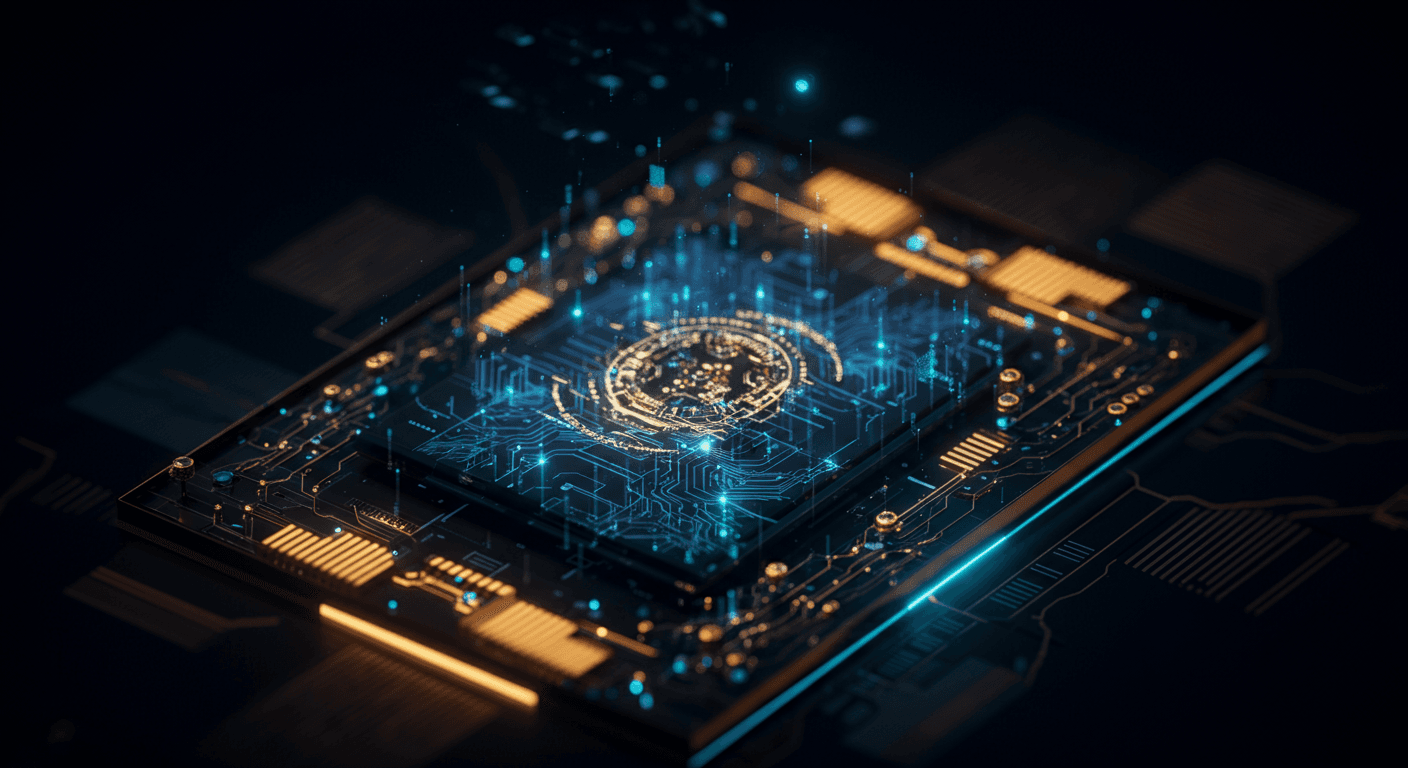AI News Today: Meta Faces Probe, Universal Robot Brains, and Sam Altman's Job Loss Warning

As Meta faces antitrust probes for pre-installing AI in WhatsApp and Sam Altman warns of potential "total" job losses due to AI, it's clear AI's rapid advancement demands careful attention. Stay ahead of regulatory changes and potential career shifts by prioritizing AI news and continuous learning. Equip yourself with the knowledge to navigate the evolving AI landscape and prepare for the future of work.
Meta Faces EU Antitrust Probe Over WhatsApp AI Integration
The tech world is buzzing as Meta finds itself in the crosshairs of European regulators, facing an antitrust probe that could have significant repercussions.
Italy Launches Meta Antitrust Probe
The heart of the matter? Italy's Competition Authority has launched an investigation into Meta's practice of pre-installing Meta AI within WhatsApp. The concern is that users are not being given a genuine choice regarding whether or not they want to use the AI features. It's like finding an app already loaded on your new phone, except this one comes with the potential for data collection and algorithmic influence. This probe centers around the allegation that Meta is leveraging its dominant position in the social messaging market to force adoption of its AI services. Consider this: are users truly consenting when the option is essentially "on" by default?
The Stakes: Potential Fines and Regulatory Scrutiny
Now, let's talk about what's at risk. The potential penalty for Meta could be substantial, reaching up to 10% of its global revenue. That's a figure that would make even the most deep-pocketed tech giant take notice. But the fines are just one aspect of the problem. This investigation signals a broader trend: a stricter regulatory approach to AI integrations within the European Union. It suggests that regulators are becoming increasingly vigilant about ensuring that AI deployments comply with existing competition laws and data privacy regulations. Meta, already under pressure on multiple fronts, now faces a more challenging landscape for its AI ambitions in Europe. This also highlights the importance of staying up-to-date on AI News to be aware of any regulatory changes or announcements that could impact how AI tools are being used.
A Bellwether for EU AI Regulation
This investigation is more than just a case against Meta; it's a test case for how the EU intends to regulate AI.
The EU has been at the forefront of AI regulation with initiatives like the EU AI Act, a landmark piece of legislation designed to ensure the responsible development and deployment of AI technologies. The probe into Meta's WhatsApp AI integration aligns with the EU's broader objective of fostering a competitive and ethical AI ecosystem. It underscores the importance of transparency, user consent, and fair competition in the age of AI. As AI continues to permeate various aspects of our lives, regulatory scrutiny will only intensify. Businesses need to prioritize ethical considerations and compliance from the outset, or risk facing similar challenges. For example, companies can look to use AI tools that help with staying compliant. This is similar to using Grammarly, the popular AI writing assistant, to help you produce error-free, compliant content.
As the investigation unfolds, all eyes will be on Brussels and Menlo Park. The outcome could set a precedent for how AI is integrated into consumer-facing platforms across Europe, and potentially beyond. This is a clear sign that the era of unchecked AI expansion is coming to an end, and a new era of regulatory accountability is dawning.

Skild AI Unveils “Skild Brain” for Universal Robot Intelligence
Imagine a world where robots can seamlessly adapt to any task, any environment, without needing specialized programming for each new job. That future may be closer than we think, thanks to a groundbreaking innovation in AI.
Skild Brain: The Universal Robot Controller
Skild AI, a company backed by tech giants like Amazon and SoftBank, has just unveiled its ambitious "Skild Brain" project. This isn't just another incremental upgrade; it's a general-purpose AI designed to serve as the central nervous system for a wide array of robotic platforms. Think of it as a universal remote control for robots, capable of orchestrating complex movements and actions across different hardware.
- Versatility is Key: The beauty of Skild Brain lies in its adaptability. Instead of requiring custom-built AI for each type of robot, Skild Brain offers a single, unified system that can be trained and deployed across diverse robotic systems. This dramatically reduces development time and costs, opening up new possibilities for automation.
- Amazon and Softbank Backing: With titans like Amazon and Softbank throwing their weight behind Skild AI, it underscores the profound potential they see in this technology to revolutionize industries worldwide.
Revolutionizing Industrial Automation
The implications of a universal robot brain like Skild Brain are enormous, particularly for industrial automation. Currently, factories and warehouses rely on specialized robots designed for specific tasks. Retooling or repurposing these robots often requires significant investment in time and resources. N8N is another tool that can help automate processes but doesn't focus solely on robotics, like Skild AI. Skild Brain promises to change this paradigm.
- Accelerated Deployment: By providing a common AI platform, Skild Brain can significantly accelerate the deployment of robots in various industrial settings. Companies can quickly adapt their automation strategies to meet changing demands, without being constrained by the limitations of specialized hardware or software.
- Complex Task Management: This general-purpose AI for robotics empowers robots to handle more complex and dynamic tasks. Imagine robots collaborating on assembly lines, navigating unpredictable warehouse environments, or even performing intricate maintenance procedures – all orchestrated by a single, intelligent system.
The launch of Skild Brain represents a major leap forward in robotics, potentially unlocking unprecedented levels of efficiency and flexibility in industrial automation.
Skild AI's ambitious endeavor highlights the growing trend toward creating more versatile and adaptable AI systems. As AI continues to evolve, we can expect to see even more innovations that blur the lines between specialized and general-purpose intelligence, paving the way for a future where robots can seamlessly integrate into every aspect of our lives. But, what about other innovations in AI? Let's take a closer look at Meta.
Microsoft Renegotiates OpenAI Partnership for Continued AI Access
The race for AI dominance is not just about creating the smartest models, but also about securing long-term access to them. Microsoft is making sure it stays in the game.
Securing the Future: Microsoft's OpenAI Renegotiation
Microsoft is reportedly renegotiating its partnership with OpenAI to guarantee uninterrupted access to cutting-edge AI technology, even in a hypothetical post-AGI world. Think of it like this: Microsoft doesn't just want to rent the AI; they want a seat at the table, no matter how the future unfolds. This move signals a strategic imperative to maintain its competitive edge in the rapidly evolving AI landscape. This could involve an updated contract that includes clauses related to the development and deployment of artificial general intelligence (AGI).
Deal Extension: Cloud Partnership and Co-Development
The renegotiated deal is expected to extend the existing cloud partnership and co-development rights through 2030. Microsoft is not only investing heavily in OpenAI's technology but also integrating it deeply into its own ecosystem. This extended partnership ensures that Microsoft continues to benefit from OpenAI's innovations. Imagine Microsoft's Azure Machine Learning platform supercharged with OpenAI's latest advancements, creating a powerhouse for AI development and deployment.
Key benefits of this deal may include:
- Continued access to OpenAI's models, ensuring Microsoft remains at the forefront of AI innovation.
- Enhanced integration with Microsoft cloud services, making AI more accessible to businesses.
- Joint development of new AI technologies, driving further advancements in the field.
Power Balance: Cloud Providers and AI Innovators
The outcome of this renegotiation will significantly impact the strategic balance of power among major cloud providers and AI innovators. If Microsoft succeeds in securing long-term, preferential access to OpenAI's technology, it could further solidify its position as a leading AI player. This deal could set a precedent for how other tech giants approach AI partnerships, potentially leading to a more consolidated and competitive AI market. This agreement underscores the vital role of cloud infrastructure in facilitating the advancement and widespread use of AI. Companies like Amazon with AWS and Google with Google Cloud AI will be watching closely.
Microsoft's proactive approach to securing its AI future demonstrates its commitment to leading the charge in this technological revolution. As we continue to monitor these developments, stay tuned to AI News on Best AI Tools for the latest updates and insights into the ever-changing world of artificial intelligence.

China Doubles Down on AI Self-Reliance at WAIC 2025
The global race for AI dominance is heating up, and China's strategy is becoming increasingly clear.
WAIC 2025: A Showcase of Chinese AI Innovation
\The World Artificial Intelligence Conference (WAIC) 2025 in Shanghai served as a powerful demonstration of China's commitment to AI self-reliance. This year's conference saw a doubling in the number of domestic AI firms exhibiting their latest technologies compared to previous years. From cutting-edge AI chips to innovative software solutions, Chinese companies were eager to showcase their progress and ambition.
WAIC 2025 underscored China's determination to become a global leader in artificial intelligence, fostering a vibrant ecosystem of local talent and innovation.
The atmosphere at WAIC 2025 was electric, with attendees buzzing about the rapid advancements in China's AI capabilities. The conference wasn't just a trade show; it was a statement of intent, signaling China's ambition to compete with the best in the world. For example, you might have seen companies showing off their new AI models, each claiming to be more powerful than the last. You may even be able to use a tool like Deepseek, which is known for its coding and language model, and other AI tools to accelerate this innovation in China.
A $139 Million Boost for Local AI Startups
Beyond the impressive displays at WAIC, the Chinese government is putting its money where its mouth is. A new municipal subsidy program was unveiled, committing a staggering $139 million to support local AI startups. This substantial investment aims to fuel innovation, attract talent, and accelerate the development of a thriving China AI development ecosystem.
This financial boost will provide crucial resources for startups to scale their operations, conduct research and development, and compete in the global market. The subsidy program is designed to encourage collaboration between research institutions, universities, and private companies, fostering a synergistic environment for AI innovation. Think of it like a venture capital fund specifically dedicated to nurturing Chinese AI startups. This fund can then be used for tools like TensorFlow which can help these AI startups.
Geopolitical Implications of AI Self-Reliance
China's push for an independent AI ecosystem is more than just an economic strategy; it underscores the intensifying geopolitical competition in the field of artificial intelligence. As AI becomes increasingly central to national security, economic competitiveness, and technological advancement, countries are vying for leadership in this transformative technology.
The drive for AI self-reliance reflects a growing awareness of the strategic importance of AI in the 21st century. It's about ensuring national security, maintaining economic competitiveness, and shaping the future of technology on their own terms.
This trend has significant implications for the global AI landscape. As China invests heavily in its domestic AI industry, it is likely to become an even more formidable player in the global market. This could lead to increased competition, technological breakthroughs, and new opportunities for collaboration and innovation. Keeping up to date with AI News will be vital. Moreover, the focus on AI self-reliance may also lead to the development of unique AI solutions tailored to the specific needs and challenges of the Chinese market. Ultimately, China's commitment to AI self-reliance is reshaping the global AI landscape and setting the stage for a new era of technological competition and innovation.
Mega-Deals Reshape the AI Hardware Landscape: Tesla, Samsung, Foxconn, and Groq
The AI hardware landscape is undergoing a seismic shift, with mega-deals and strategic alliances reshaping the future of AI infrastructure. Let's dive into the key developments that are making headlines.
Tesla and Samsung's $16.5 Billion AI Chip Partnership
In a move that underscores the growing importance of in-house AI chip development, Tesla and Samsung have inked a monumental $16.5 billion agreement. The partnership will see Samsung producing Tesla's next-generation AI chips at its advanced manufacturing facility in Texas. This deal is a massive win for both companies. For Tesla, securing a reliable supply of cutting-edge AI chips is crucial for its autonomous driving efforts and AI-driven products. For Samsung, it's a significant validation of its chip manufacturing capabilities and a boost to its presence in the US market. This collaboration highlights the trend of major tech companies seeking greater control over their AI hardware supply chains, reducing reliance on traditional chipmakers and fostering innovation.
Foxconn and TECO Team Up to Build Modular AI Data Centers
As AI models become more complex and data-intensive, the demand for robust and scalable AI data centers is skyrocketing. Addressing this need, Foxconn, a global leader in electronics manufacturing, and TECO, an industrial solutions provider, have joined forces to develop modular AI data centers. This alliance aims to create standardized, pre-fabricated data center units that can be quickly deployed and easily scaled to meet evolving AI workloads. This approach offers several advantages, including reduced construction time, lower costs, and greater flexibility in adapting to changing infrastructure requirements. The partnership between Foxconn and TECO signifies a growing trend towards modular and scalable AI infrastructure solutions, enabling businesses to efficiently manage and expand their AI capabilities. Companies are increasingly seeking tools like n8n, an open-source workflow automation platform, to orchestrate and manage the complex processes within these advanced data centers.
Groq Nears $600 Million Funding Round
Groq, a company specializing in AI accelerators, is reportedly nearing a $600 million funding round, which would double its valuation in just nine months. This significant investment reflects the growing excitement around Groq's innovative chip architecture, which is designed to deliver exceptional performance for AI inference workloads. Groq's technology promises to accelerate AI applications across various industries, from natural language processing to computer vision. The company's rapid growth and increasing valuation highlight the intense competition and investor interest in the AI hardware space, as companies race to develop faster, more efficient, and more specialized AI chips. Keep an eye on our AI News section for more updates on Groq's funding and future developments.
The Significance of AI Hardware Partnerships and Investments
These mega-deals, partnerships, and funding rounds underscore the critical importance of AI hardware in driving the next wave of AI innovation. AI chips are the engine that powers AI models, and the availability of high-performance, cost-effective hardware is essential for realizing the full potential of AI. The rise of AI data centers reflects the increasing demand for scalable infrastructure to support the growing complexity and data intensity of AI workloads. As AI continues to transform industries, expect to see more strategic alliances and investments in the AI hardware space, as companies seek to secure their position in this rapidly evolving landscape.
The future of AI is inextricably linked to the advancement of AI hardware. These recent developments demonstrate the industry's commitment to building the infrastructure needed to power the next generation of AI applications.
In summary, the AI hardware sector is buzzing with activity, marked by significant investments and strategic collaborations. These developments signal a robust and dynamic future for AI, paving the way for more sophisticated applications and innovations. Next, we'll examine Meta's potential privacy probe and its impact on the AI landscape.
Soul App Demonstrates Full-Duplex Conversational AI at WAIC
Imagine a world where talking to AI feels as natural as chatting with a friend. That future may be closer than we think, thanks to a groundbreaking demonstration at the World Artificial Intelligence Conference (WAIC). Soul App, a social networking platform, showcased a full-duplex speech AI capable of simultaneous, two-way conversation.
The Dawn of Natural AI Dialogue
Traditionally, our interactions with AI have been somewhat stilted. We ask a question, the AI processes it, and then provides an answer. This turn-based approach, while functional, lacks the fluidity of human conversation. Soul App's demonstration, however, represents a significant leap forward. Their full-duplex conversational AI allows for real-time, natural dialogues where both the human and the AI can speak and be heard at the same time, mimicking the seamless flow of a genuine interaction. This technology goes beyond simple chatbots, enabling a more engaging and dynamic user experience.
To illustrate, think about trying to explain a complex idea to ChatGPT, the popular AI chatbot from OpenAI. With current technology, you have to wait for ChatGPT to finish its response before clarifying a point. With full-duplex AI, you could interrupt, offer additional context, or even collaborate on the idea in real-time, just like you would with another person.
Implications and Applications
The potential applications of this technology are vast. Imagine:
- Enhanced customer service: AI assistants that can truly understand and respond to customer needs in real-time, leading to more efficient and satisfying interactions.
- Improved accessibility: AI companions that can provide support and companionship to individuals with disabilities, offering a more natural and intuitive way to communicate.
- More immersive gaming experiences: NPCs (Non-Player Characters) that can engage in dynamic conversations with players, making the game world feel more alive and responsive.
- Advanced language learning tools: AI tutors that can provide personalized feedback and guidance in real-time, helping learners improve their fluency and comprehension.
Full-duplex conversational AI promises to revolutionize human-machine interactions, making them more intuitive, efficient, and engaging.
Soul App's Leading Role
Soul App AI isn't just developing a cool tech demo; they are actively shaping the future of social interaction. By integrating this advanced AI into their platform, they're paving the way for more meaningful and engaging online experiences. As AI continues to evolve, expect more platforms to adopt similar technologies. Keep an eye on our AI News section for the latest updates. This represents a critical step towards truly real-time AI dialogue, blurring the lines between human and machine communication, and it will be exciting to see where it leads.
UK-Canada Launch Joint AI Alignment Fund with Industry Support
The global race to develop artificial intelligence is heating up, but so too is the effort to ensure AI systems remain safe and beneficial for humanity. In a significant move towards responsible AI development, the UK and Canada have joined forces to launch a substantial research fund.
A Transatlantic Alliance for AI Safety
Britain and Canada are spearheading the push for AI alignment with a joint £29 million (approximately $37 million USD) research fund. This initiative aims to foster groundbreaking research into AI alignment and AI safety, two critical areas that address the challenge of ensuring AI systems act in accordance with human values and intentions.
The fund represents a commitment from both nations to proactively shape the future of AI, guiding its development along a path that prioritizes safety and societal benefit.
What does this really mean? Think of it like this: imagine building a super-powerful rocket. You wouldn't just focus on speed and power; you'd also want to ensure it's got a guidance system that keeps it on course and prevents it from crashing. AI alignment is that guidance system for artificial intelligence.
Industry Giants Back the Initiative
What makes this UK-Canada AI fund particularly noteworthy is the backing it's receiving from key industry players. Tech giants such as AWS and leading AI companies like Anthropic are actively supporting the fund, lending not only their financial resources but also their expertise and insights. This collaborative approach, bringing together government and industry, is crucial for tackling the complex challenges of AI safety.
This type of backing is significant because it signifies a shared understanding of the potential risks associated with unchecked AI development. It shows that leading companies are taking responsibility and investing in research that could mitigate those risks.
The Importance of Coordinated International Research
The UK-Canada fund highlights the growing recognition that AI safety is not a problem that can be solved in isolation. Coordinated international research is essential for several reasons:
- Sharing Knowledge: AI research is progressing rapidly, and sharing findings across borders accelerates the pace of discovery.
- Addressing Global Challenges: AI systems are increasingly deployed globally, so their safety and alignment must be addressed from an international perspective.
- Promoting Ethical Standards: Collaborative efforts can help establish common ethical standards for AI development and deployment.
- Avoiding Duplication: By working together, countries can avoid duplicating research efforts and maximize the impact of their investments.
The launch of this joint AI alignment fund signals a growing global awareness of the need for responsible AI development. As AI continues to evolve and reshape our world, initiatives like this are essential to ensure that these powerful technologies are aligned with our values and contribute to the greater good. You can stay up-to-date with these and other important updates by visiting our AI News page.
Google Agrees to EU AI Code, Meta Opts Out: A Big Tech Split
In a move that underscores the complex landscape of AI regulation, Google and Meta have taken starkly different paths regarding the EU's voluntary Code of Practice on General-Purpose AI.
Google's Pledge: Embracing EU AI Standards
Google has committed to signing the EU's Code of Practice on General-Purpose AI, signaling its willingness to align with European AI governance. This voluntary code, designed to promote responsible AI development, includes measures such as:
- Transparency: Providing clear information about AI model capabilities and limitations.
- Risk Management: Implementing strategies to identify and mitigate potential risks associated with AI systems.
- Data Governance: Ensuring responsible data handling practices.
By embracing this code, Google aims to demonstrate its commitment to ethical AI practices and foster trust among users and regulators. This proactive approach could also give them a competitive edge as the EU AI Act comes into full effect. Tools like Google AI Studio can assist in this by providing a platform that encourages responsible AI development through built-in safeguards and guidelines. It provides developers with tools and resources to build and experiment with AI models responsibly. Google's compliance can be seen as a strategic move to shape the future of AI regulation, positioning itself as a leader in responsible AI innovation.
Meta's Hesitation: Concerns over Innovation
In contrast to Google's embrace, Meta has declined to participate in the EU's voluntary AI code. Meta's decision stems from concerns that the code could unduly constrain innovation. The company fears that strict adherence to the code's guidelines might stifle the development of new AI technologies and applications. Meta's stance highlights a broader debate within the tech industry about the balance between regulation and innovation.
"We believe that overly prescriptive regulations can hinder the rapid pace of AI innovation," a Meta spokesperson stated. "We are committed to responsible AI development but prefer a more flexible approach that allows us to adapt to evolving technologies."
Meta's AI at Meta initiatives continue, but the company seems to prefer navigating the regulatory landscape on its own terms, possibly leveraging its internal AI ethics frameworks and lobbying efforts. Meta's approach could be interpreted as a calculated risk, betting that its own internal standards and engagement with policymakers will suffice to address regulatory concerns, while preserving its ability to innovate freely.
A Divergent Path: Implications for the AI Landscape
This split between Google and Meta underscores the diverse compliance strategies emerging within the Big Tech landscape. While Google seeks to align with regulatory trends, Meta prioritizes innovation flexibility. This divergence highlights the challenges of creating a unified regulatory framework for AI, given the varying priorities and philosophies of different tech giants. The AI News section frequently reports on these conflicting approaches, noting how they influence policy and the overall direction of AI development. Ultimately, the contrasting decisions of Google and Meta will likely shape the ongoing dialogue between industry and regulators, influencing the future of AI governance in Europe and beyond. As AI continues to evolve, understanding these strategic choices becomes crucial for navigating the complex interplay of innovation and regulation. Tools like Deepseek, with its focus on efficient and cost-effective AI solutions, might find themselves in a sweet spot, balancing innovation with the practical demands of regulatory compliance. Deepseek is an AI tool focusing on code generation, offering efficient and cost-effective AI solutions, suitable for various applications and developments.
Sam Altman Warns of “Total” Job Losses Due to AI Advancement
Hold on to your hats, folks, because the AI rollercoaster just took another sharp turn!
Altman's Stark Prediction: "Total" Job Displacement
OpenAI CEO Sam Altman, the very person at the helm of arguably the most influential AI company right now, has issued a stark warning: AI isn't just going to change jobs; it's going to eliminate entire categories of them. Think about that for a moment. We're not just talking about automating repetitive tasks; Altman envisions a future where entire professions become obsolete, swept away by the relentless tide of AI advancement. This isn't a subtle shift; it's a potential seismic event for the global workforce.
"AI will do your job" could become the new normal for some sectors, meaning retraining and adaptation will be more critical than ever.
This raises some serious questions. Which jobs are most at risk? What skills will be valuable in an AI-dominated landscape? And how do we prepare the millions of people who may find their livelihoods vanishing? The answers are far from clear, but one thing is certain: the conversation about AI and employment is about to get a whole lot more urgent.
Beyond Jobs: National Security Concerns
But Altman's concerns don't stop at the economic level. He also raised a red flag about the potential national security risks associated with unchecked AI development. Imagine AI falling into the wrong hands, used to create sophisticated cyberattacks, spread disinformation on a massive scale, or even develop autonomous weapons systems. The implications are chilling. This underscores the critical need for robust AI governance frameworks, both nationally and internationally, to ensure that AI is used for good and not as a tool for malicious actors.
The Clock is Ticking: Policy Debates Intensify
Altman's warnings couldn't have come at a more crucial time. Policymakers around the world are grappling with the complex challenge of how to regulate AI, balancing the need to foster innovation with the imperative to mitigate potential risks. His remarks serve as a wake-up call, adding fuel to the fire of ongoing debates about workforce transition programs, ethical guidelines for AI development, and international cooperation on AI safety standards. We're seeing heightened interest in AI News about responsible AI practices and governmental regulations.
The pressure is on to develop proactive strategies to address the potential consequences of AI, both positive and negative. Ignoring Altman's warnings would be akin to ignoring the storm clouds gathering on the horizon – a decision we might soon regret. Understanding AI Fundamentals is crucial for navigating these discussions. As AI continues its rapid evolution, the stakes are only going to get higher, demanding immediate and thoughtful action from leaders across all sectors. Now is the time to turn warnings into actionable solutions and create a future where AI benefits everyone, not just a select few. For example, we could use tools such as Datacamp to help people to upscale for these new jobs.
🎧 Listen to the Podcast
Hear us discuss this topic in more detail on our latest podcast episode: https://open.spotify.com/episode/0BSUPzk4sebWZl5jj51Zkl?si=uIsG0Iv2TIO3DCq_LwHrdQ
Keywords: AI, Artificial Intelligence, AI regulation, robotics, AI ethics, OpenAI, Microsoft AI, AI chips, AI funding, AI safety, AI job displacement, Skild AI, Meta AI, China AI, universal robot intelligence
Hashtags: #AI #ArtificialIntelligence #TechNews #Robotics #AIethics
For more AI insights and tool reviews, visit our website https://best-ai-tools.org, and follow us on our social media channels!
- Website: https://best-ai-tools.org
- X (Twitter): https://x.com/bitautor36935
- Instagram: https://www.instagram.com/bestaitoolsorg
- Reddit: https://www.reddit.com/r/findAIwithAI/
- Telegram: https://t.me/BestAIToolsCommunity
- Medium: https://medium.com/@bitautor.de
- Spotify: https://creators.spotify.com/pod/profile/bestaitools
- Facebook: https://www.facebook.com/profile.php?id=61577063078524
- YouTube: https://www.youtube.com/@BitAutor
Recommended AI tools
OpenAI Academy
Conversational AI
Empowering the next generation of AI innovators
AI Undresser
Image Generation
Uncover the hidden truth
Credo AI
Data Analytics
The trusted leader in AI governance
Islam & AI
Conversational AI
Bridging Islam and Artificial Intelligence
AI for daily life
Search & Discovery
Discover how AI can make your life easier
Responsible AI Institute
Scientific Research
Empowering Ethical AI
Was this article helpful?
Found outdated info or have suggestions? Let us know!


